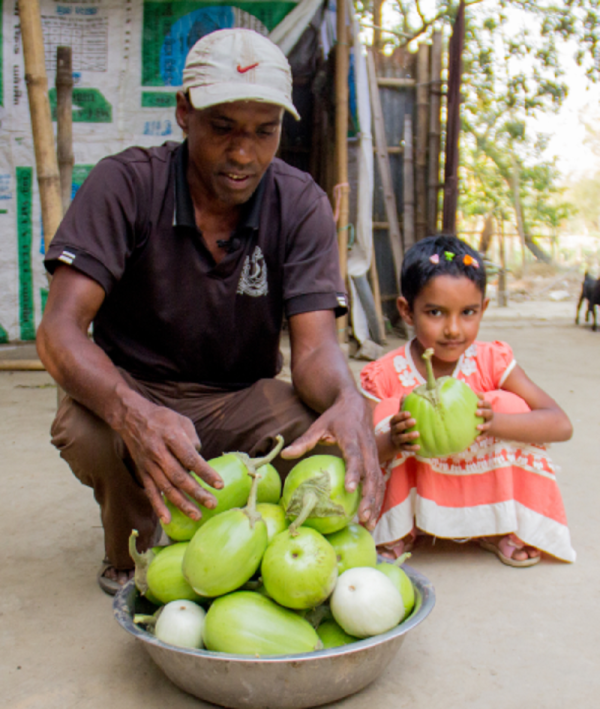
Farmers have achieved significantly higher yields and revenues by growing genetically engineered, insect-resistant eggplant (Bt brinjal), which has gained market acceptance in Bangladesh, a new study reported.
The four Bt brinjal varieties yielded on average 19.6 percent more than non-Bt varieties and earned growers 21.7 percent higher revenue, according to the study published May 25 in Frontiers in Bioengineering and Biotechnology. This additional revenue per hectare is equal to about US$664 — a substantial sum for resource-poor farmers in Bangladesh.
Significantly, 83 percent of Bt brinjal growers were satisfied with the yields obtained and 80 were satisfied with the quality of fruit, compared to just 59 percent of non-Bt brinjal growers who were pleased with their yields.
Some 28 percent of the non-Bt farmers also indicated that a large portion of their fruit was infested with eggplant fruit and shoot borer (EFSB) larvae. This was not a concern for Bt brinjal, because it provides inherent resistance to that insect pest through the cry1Ac gene that was introgressed into four local, open-pollinated brinjal varieties.
The paper, based on a 2019 survey of Bt and non-Bt brinjal farmers, is the first to document the economic benefits of the four existing Bt eggplant varieties though the Bangladeshi market chain and their acceptability to farmers and consumers, said Cornell University Prof. Tony Shelton, lead author.
In light of the higher yields, increased revenue and good quality of the fruit, three-quarters of Bt brinjal farmers said they planned to grow the crop again next season. Brinjal is the second most important vegetable grown in Bangladesh, cultivated by about 150,000 resource-poor farmers on 50,955 hectares, and consumed on a daily basis by the public.
“We were very interested to discover that 40 percent of the farmers who did not grow Bt eggplant had never heard of it,” Shelton said. “But when they heard about it from Bt eggplant farmers, 71 percent said they wanted to grow Bt eggplant the following year.”
Bt brinjal was developed by the Bangladesh Agricultural Research Institute (BARI) in conjunction with Mahyco, Cornell University and the United States Agency for International Development in an effort to stop the losses caused by EFSB caterpillars and reduce pesticide use. The EFSB causes between 30 and 60 percent yield loss — even when insecticides are frequently sprayed on the crop. Farmers typically apply insecticides over 80 times during the four-to-five-month brinjal growing season.
Previous studies confirmed that all four Bt brinjal varieties provided virtually complete control of EFSB without the use of insecticides and generated higher gross returns than their non-Bt equivalents. Bt brinjal was approved for commercial release in October 2013 following seven years of greenhouse and confined field trials in Bangladesh that confirmed the improved crop’s efficacy and environmental safety.
Since then, farmers have rapidly adopted the crop, attracted to the six-fold increase in net revenues over non-Bt varieties and a 61 percent reduction in pesticide expenses, as documented by previous studies. The new study again confirms that Bt brinjal farmers enjoy higher yields and profits and lower pesticide use.
This study also focused on Bt brinjal in the market and found that Bt brinjal sold at the local markets, either to wholesalers or direct to consumers (retail sales), fetched a higher price than non-Bt brinjal. Some buyers were prepared to pay higher prices for Bt brinjal because the fruit was less damaged than non-Bt brinjal. However, some buyers preferred their traditional local varieties, which were non-Bt and required intensive insecticide management practices to control EFSB.
The study also found that 14 percent more labor — expressed in eight-hour days – was required to harvest, grade and package the Bt brinjal crop. This was due to the higher yields, but this cost would be recouped when the product was sold in the marketplace. In contrast, non-Bt brinjal farmers have increased labor costs for insecticide applications, as well as the cost of insecticides.
Two important lessons were learned from this study, according to Shelton. “First, Bt brinjal is being accepted in the market, but more Bt varieties suitable to local preferences need to be developed. Second, non-Bt farmers are willing to adopt this technology, especially after hearing about its benefits from Bt brinjal farmers. Farmers are the best advocates for this technology, which reduces their production costs while also reducing hazards to the environment and consumers.”
The survey was conducted in the five most important brinjal producing districts in Bangladesh — Rangpur, Bogra, Rajshahi, Jessore and Tangail — through face-to-face interviews with 195 Bt farmers and 196 non-Bt farmers. Farmers made their own choice on which crop to grow.
Other authors include Sayed H. Sarwer and Md J. Hossain of the Feed the Future South Asia Eggplant Improvement Partnership at Cornell University; Graham Brooks of PG Economics, Stafford House, in the United Kingdom; and Vijay Paranjape of Sathguru Management Consultants Pvt. Ltd., in Hyderabad, India.


